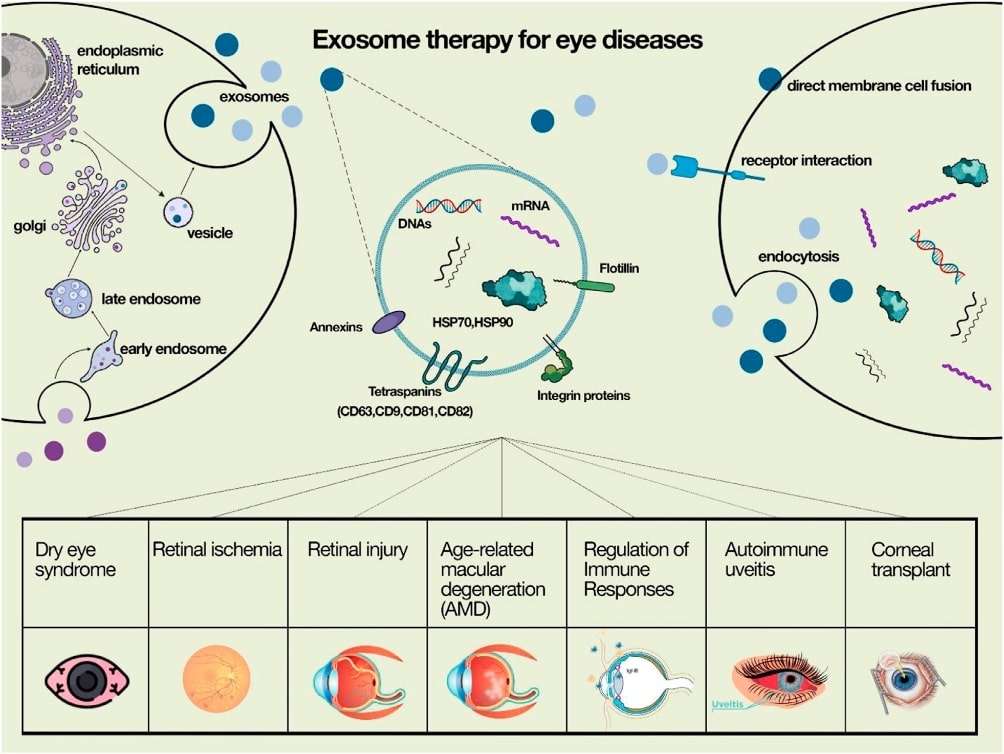Therapeutic Exosomes for Eye Disease
With the aggravation of eye burden and the development of the aging trend, the number of patients with eye diseases (EDs) is increasing year by year. EDs can affect vision in mild cases and cause blindness in severe cases. Therefore, EDs have a great impact on human health and life. In recent years, multiple preclinical studies have demonstrated that therapeutic exosomes can diffuse in the eye to treat EDs. With a high-level talent team and advanced equipment, Creative Biolabs can provide customers with a full range of exosome drug-related research services.
Eye Diseases (EDs) and Exosomes
The eyes are very important sensory organs for humans. Humans can only see things through their eyes. Poor eye hygiene, excessive eye fatigue, prolonged use of electronic products, genetics, and aging can easily lead to various EDs. Untimely and incorrect treatment of EDs can easily lead to blindness. EDs are still not completely treated by current drugs. Numerous studies have demonstrated that exosomes can protect drugs from extracellular degradation and deliver drugs to recipient cells in a highly specific manner. Several clinical studies have been conducted on the therapeutic application of exosomes in EDs.
 Fig.1 Exosomes have been introduced as a novel agent in cell-free therapy for eye diseases.1,2
Fig.1 Exosomes have been introduced as a novel agent in cell-free therapy for eye diseases.1,2
Dry eye syndrome is an eye disease caused by tear secretion disorder with dry eyes as the main symptom. Severe dry eye can lead to corneal damage and even vision impairment. At present, some studies have found that therapeutic exosomes for eye dryness, in the form of eye drops, can improve the immune microenvironment of the cornea and reshape the microenvironment of the ocular surface. Such therapeutic exosomes are expected to be used in the daily treatment of dry eye in the future. The retina is a soft and transparent membrane located on the inner wall of the eyeball, which is responsible for sensing light stimulation and imaging. Retinal damage or disease can lead to dark shadows in front of the eyes, decreased vision, and even blindness. Unfortunately, the retina cannot be regenerated. However, therapeutic exosomes for retinal repair have been reported to inhibit apoptosis of retinal cells, reduce the oxidation level of retinal pigment epithelium cells (RPECs) and enhance the proliferation of RPECs by intravitreal injection or retrobulbar injection. This opens up new avenues for cell-free therapy of retinal diseases.
Creative Biolabs has always been concerned about the research progress of EDs-related exosome drugs. We can provide customers with the best one-stop services related to exosome drug research. Please feel free to contact us for your research needs.
References
-
Rad, LM.; et al. Therapeutic Potential of Microvesicles in Cell Therapy and Regenerative Medicine of Ocular Diseases With an Especial Focus on Mesenchymal Stem Cells-Derived Microvesicles. Frontiers Genetics. 2022, 13:847679.
-
under Open Access license CC BY 4.0, without modification.
For Research Use Only. Cannot be used by patients.
Related Services:

 Fig.1 Exosomes have been introduced as a novel agent in cell-free therapy for eye diseases.1,2
Fig.1 Exosomes have been introduced as a novel agent in cell-free therapy for eye diseases.1,2









